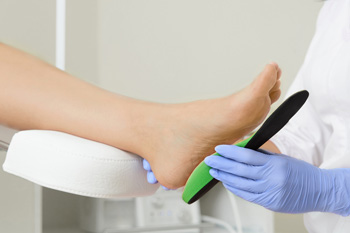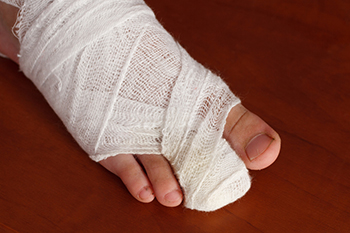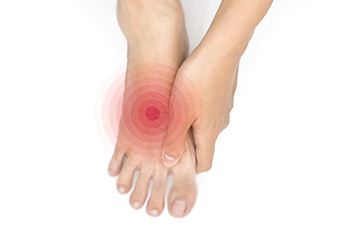Connect With Us
Blog
Items filtered by date: July 2023
Which Type of Orthotic Do I Need?

Orthotics are insoles that are worn in the shoes to provide additional support for the feet. They are used for different reasons, including overall foot health, abnormal foot structure, and various foot ailments. There are several kinds of orthotics to choose from. Orthotics that are prescribed by a podiatrist are designed to fit and correct an individual's unique foot and specific condition. They are made by taking an impression of the feet and can be successful in treating plantar fasciitis, flat feet, or heel spurs. Mass-produced inserts are referred to as prefabricated orthotics, and can fit a large range of foot types. They can be purchased in a pharmacy, and are available in numerous sizes and arch types. People who have mild foot pain may benefit from over-the-counter insoles, which may provide temporary relief. If you have any type of foot pain, it is strongly suggested that you consult with a podiatrist who can help you to choose the right type of orthotics based on the cause of your foot pain.
If you are having discomfort in your feet and would like to try orthotics, contact Dr. David Ungar from Personal Foot Care. Our doctor can provide the care you need to keep you pain-free and on your feet.
What Are Orthotics?
Orthotics are inserts you can place into your shoes to help with a variety of foot problems such as flat feet or foot pain. Orthotics provide relief and comfort for minor foot and heel pain but can’t correct serious biomechanical problems in your feet.
Over-the-Counter Inserts
Orthotics come in a wide variety of over-the-counter inserts that are used to treat foot pain, heel pain, and minor problems. For example, arch supports can be inserted into your shoes to help correct overarched or flat feet, while gel insoles are often used because they provide comfort and relief from foot and heel pain by alleviating pressure.
Prescription Orthotics
If over-the-counter inserts don’t work for you or if you have a more severe foot concern, it is possible to have your podiatrist prescribe custom orthotics. These high-quality inserts are designed to treat problems such as abnormal motion, plantar fasciitis, and severe forms of heel pain. They can even be used to help patients suffering from diabetes by treating foot ulcers and painful calluses and are usually molded to your feet individually, which allows them to provide full support and comfort.
If you are experiencing minor to severe foot or heel pain, it’s recommended to speak with your podiatrist about the possibilities of using orthotics. A podiatrist can determine which type of orthotic is right for you and allow you to take the first steps towards being pain-free.
If you have any questions please contact our office located in Farmington, MI . We offer the newest diagnostic and treatment technologies for all your foot and ankle needs.
Sever’s Disease and the Heel’s Growth Plate

Heel pain in children may be a sign of Sever’s disease, which is a foot condition that affects physically active young children and teenagers. While it can cause severe pain and discomfort and is considered to be the most common cause of heel pain in children, it generally does not cause long-term damage. Sever's disease is defined as an inflamed growth plate in the heel. This can happen from excessive force or overuse, resulting in heel pain. This plate is necessary for shaping the heel bone, in addition to producing tissue for proper growth. Some types of activities that can contribute to developing Sever’s disease include running, jumping, or standing for extended periods of time. It can affect basketball or soccer players, and gymnasts may also feel the effects of Sever’s disease. Common symptoms that are associated with Sever's disease can consist of a swollen and reddened heel, and it can be difficult to walk. Mild relief may happen when the offending activity is temporarily stopped and the foot is frequently elevated. If your child has heel pain, it is strongly suggested that you consult with a podiatrist who can effectively diagnose and treat Sever's disease.
Sever's disease often occurs in children and teens. If your child is experiencing foot or ankle pain, see Dr. David Ungar from Personal Foot Care. Our doctor can treat your child’s foot and ankle needs.
Sever’s Disease
Sever’s disease is also known as calcaneal apophysitis, which is a medical condition that causes heel pain I none or both feet. The disease is known to affect children between the ages of 8 and 14.
Sever’s disease occurs when part of the child’s heel known as the growth plate (calcaneal epiphysis) is attached to the Achilles tendon. This area can suffer injury when the muscles and tendons of the growing foot do not keep pace with bone growth. Therefore, the constant pain which one experiences at the back of the heel will make the child unable to put any weight on the heel. The child is then forced to walk on their toes.
Symptoms
Acute pain – Pain associated with Sever’s disease is usually felt in the heel when the child engages in physical activity such as walking, jumping and or running.
Highly active – Children who are very active are among the most susceptible in experiencing Sever’s disease, because of the stress and tension placed on their feet.
If you have any questions, please feel free to contact our office located in Farmington, MI . We offer the newest diagnostic and treatment technologies for all your foot and ankle injuries.
Are You Suffering From Ingrown Toenails?
A Broken Toe and the Buddy Taping Method

There are several bones in each foot, and any one of them may become fractured. Common reasons a broken toe can happen can include dropping a heavy object on it or stubbing it into a piece of furniture. The pinky toe can easily break, as it is located on the outermost part of the foot. Many people experience immediate symptoms that can consist of bruising and swelling, and it can be difficult to walk. Mildly broken toes may be treated by using the buddy taping method, which is done by taping the broken toe to the toe next to it. This can be effective in providing necessary stability as it heals. Severely broken toes may have a bone protruding from it and will often be accompanied by bleeding and severe pain. Some patients may have difficulty moving the affected toe after it has healed, which may indicate arthritis has developed. If you have broken your toe, it is suggested that you contact a podiatrist who can effectively diagnose and guide you toward the treatment option that is best for you.
Broken toes may cause a lot of pain and should be treated as soon as possible. If you have any concerns about your feet, contact Dr. David Ungar from Personal Foot Care. Our doctor will treat your foot and ankle needs.
What Is a Broken Toe?
A broken toe occurs when one or more of the toe bones of the foot are broken after an injury. Injuries such as stubbing your toe or dropping a heavy object on it may cause a toe fracture.
Symptoms of a Broken Toe
- Swelling
- Pain (with/without wearing shoes)
- Stiffness
- Nail Injury
Although the injured toe should be monitored daily, it is especially important to have a podiatrist look at your toe if you have severe symptoms. Some of these symptoms include worsening or new pain that is not relieved with medication, sores, redness, or open wounds near the toe.
If you have any questions, please feel free to contact our office located in Farmington, MI . We offer the newest diagnostic and treatment technologies for all your foot care needs.
Refrain from Smoking and Walking Barefoot if Diabetic

Diabetes is a serious medical condition that can affect the nerves in the feet. Many diabetic patients develop neuropathy, which is the inability to feel cuts and scrapes that have developed on the feet. This can lead to getting infections and foot ulcers, both of which need immediate medical attention. Proper diabetic foot care begins with washing and drying the feet daily, followed by inspecting the soles of the feet for any abrasions. Many people choose to use a mirror to do this, or to ask a family member or caregiver to help them accomplish this. Additionally, it is beneficial for the toenails to be trimmed weekly. It is wise to stop smoking, if applicable, which may help to increase blood flow to the feet. Many diabetic patients know the importance of wearing shoes at all times, which can help to prevent stepping on objects that can damage the skin. If you have diabetes, it is strongly suggested that you are under the care of a podiatrist who can help you to manage this condition.
Diabetic foot care is important in preventing foot ailments such as ulcers. If you are suffering from diabetes or have any other concerns about your feet, contact Dr. David Ungar from Personal Foot Care. Our doctor can provide the care you need to keep you pain-free and on your feet.
Diabetic Foot Care
Diabetes affects millions of people every year. The condition can damage blood vessels in many parts of the body, especially the feet. Because of this, taking care of your feet is essential if you have diabetes, and having a podiatrist help monitor your foot health is highly recommended.
The Importance of Caring for Your Feet
- Routinely inspect your feet for bruises or sores.
- Wear socks that fit your feet comfortably.
- Wear comfortable shoes that provide adequate support.
Patients with diabetes should have their doctor monitor their blood levels, as blood sugar levels play such a huge role in diabetic care. Monitoring these levels on a regular basis is highly advised.
It is always best to inform your healthcare professional of any concerns you may have regarding your feet, especially for diabetic patients. Early treatment and routine foot examinations are keys to maintaining proper health, especially because severe complications can arise if proper treatment is not applied.
If you have any questions please feel free to contact our office located in Farmington, MI . We offer the newest diagnostic and treatment technologies for all your foot and ankle needs.

